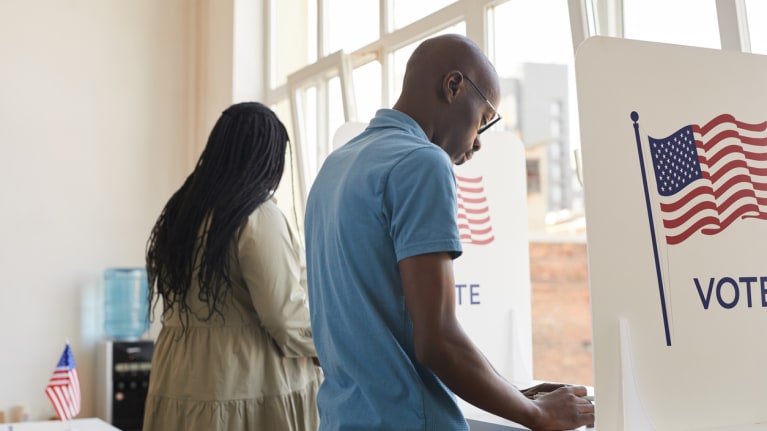

?Election Day and the days that follow can bring both joy and tension to workplaces.
Some workers may openly celebrate the results—while others may feel sad, defeated or furious. Employees with different political beliefs could engage in heated arguments, leading to a tense and unproductive workplace that undermines employee morale.
This year’s results could be particularly contentious, with some states presenting ballot measures on abortion, marijuana, minimum wage and unions.
“You likely have a divided workplace when it comes to political opinions, which is heightened and maybe even exposed during the political season,” said Stephen Paskoff, CEO of training company Employment Learning Innovations in Atlanta. “Whether the tension is expressed clearly or not, it can create a hostile environment for everyone.”
Talking politics has become increasingly common at work. According to a 2019 survey by the Society for Human Resource Management (SHRM):
- 26 percent of workers admit to regularly talking politics in the workplace.
- 42 percent have had a “political disagreement” at work.
- 12 percent have experienced political affiliation bias.
A 2022 SHRM survey found that 20 percent of workers say they’ve been mistreated due to their political views. And 20 percent of HR professionals say there is greater political volatility at work than there was three years ago.
Postelection discussions—if not managed transparently and with guidelines for civil discourse—can result in adverse employee experiences for those involved.
HR Shouldn’t Ban Civil Discussions
Paskoff, a former litigator with the U.S. Equal Employment Opportunity Commission, said that HR professionals must get ahead of the tension by issuing “values” statements and scheduling team meetings around the topic.
“In finding formal ways to address an issue before it arises, leaders can use these proactive opportunities to focus on company values and acknowledge that while there are different views present at work, outside conversations can be extremely pervasive if they roll over into work settings,” he said.
When addressing postelection concerns, leadership should:
- Avoid invalidating a worker’s thoughts or experiences.
- Remind employees they are responsible for their statements and actions as well as the impact that they have on their colleagues.
- Be nonpartisan and objective.
Lola Bakare, a Philadelphia-based inclusive marketing strategist and chief marketing officer advisor, explained that postelection political discussions can be particularly sensitive for employees from underrepresented communities.
“Especially in a societal moment where the line between ‘politics’ and ‘human rights’ is increasingly blurry, employees from historically excluded communities may feel silenced and stifled,” she said.
Bakare said that while companies must find ways to prioritize employees’ psychological safety, postelection discussions shouldn’t be banned so long as they’re civil. She noted that these discussions are no less out-of-the-ordinary than banning other nonwork-related conversations.
“If office baby and wedding showers are not deemed inappropriate, neither should the discussion of other beyond-workplace happenings that impact an employee’s life,” she said. “Inclusion is not about protecting comfort at all costs. Fostering psychological safety for all will often require managing through the discomfort of some—and that discomfort is worth it.”
Additionally, Jennifer Abruzzo, the National Labor Relations Board general counsel, previously told SHRM Online that workplace conversations about political issues may also be protected under the National Labor Relations Act.
A report by Harvard Business Review suggested that employees and employers should openly listen to others’ points of view, set boundaries and express humility during political discussions to keep these conversations from escalating.
“People need to understand that respect and inclusion apply toward a range of different ideas,” Paskoff added. “Be careful with what you say and how you behave, as managing emotions and, more importantly, behavior is what matters on the job.”
Maintaining Workplace Civility
Kimberly Lee Minor, founder and CEO of boutique firm Bumbershoot in Columbus, Ohio, said that organizations should consider an all-hands meeting before, during or immediately after the election, allowing senior leadership to express zero tolerance for hostility or harm policy to everyone.
“The discussion should be followed up with an e-mail posted in break rooms and intranets,” she said. “There is a liability in allowing such dangerous activity, so why jeopardize your teammates or business?”
Leadership and HR can foster a harmonious workplace by conveying the need for productivity, results, innovation and retention of talent. Discussing taboo subjects can occur in the workplace, and failing to manage them can create a politically charged climate and can diminish the importance of these priorities, according to the newly released SHRM book Talking Taboo by SHRM Chief Knowledge Officer Alexander Alonso, Ph.D., SHRM-SCP.
The workforce must also understand that the focus is not to change how anyone thinks or feels after the election, especially since tensions can linger for weeks. HR managers should reinforce the importance of respecting one another to support a heathy culture.
“If there is no interest in maintaining civility within a conversation, it is not one that should be had with co-workers,” Paskoff added. “Leadership and HR should be available and accessible to answer questions and address concerns as well.”

